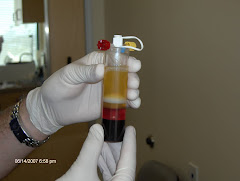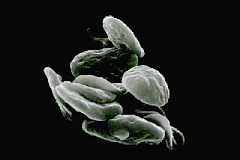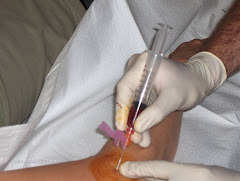



After immersing myself in the study of Platelet Rich Plasma Therapy and the larger scope of "biologics," I have been drawn to the concept of maximizing the body's natural ability to heal itself. PRP does not create a new injury, to stimulate healing, but rather takes the body's normal reaction to an area & places it at the site of limited healing. After injection patients experience discomfort above baseline anywhere from 2-5 days. Clinical benefits are often not immediate, as the cellular changes take up to months. However, we have seen dramatic improvements in most cases.
Perhaps an earlier generation in the philosophy of promoting natural healing lies in shockwave therapy. Shockwaves are administered in an office setting for a series of 3treatments at one week intervals , lasting 3 minutes each. The concept is that by alternating positive & negative pressure, shockwaves induce microtrauma (minor injury) that sends a signal to the brain to stimulate healing to an area previously dormant & injured.
We know that after a few weeks, tendons are not inflammed, but rather form a scarred & thickened structure, with blood flow changes. This new understanding has flipped our approach to tendon injuries, now termed "tendonopathies." Treating a chronic tendon injury with cortisone or anti-anflammatory medications not only has adverse side effects, but doesn't make sense.
Shockwave therapy was initially developed to break up kidney stones. However, the Europeans have been using this treatment on tendon injuries for years. It is now FDA approved for use in the U.S.
I was given a free machine for a 6 wk trial. I treated 14 patients last Tuesday. Apparently, patients may experience an improvement following the second treatment. This modality is appealing, because it is less invasive than an injection, and results are more immediate (if they occur) than PRP.
Ultimately shockwave therapy may be uses along with PRP in a protocol to maximize therapy. My colleague, a podiatrist has seen terrific results in patients that have failed conservative treatments for heel pain(achilles tendonosis & plantar fasciitis). The procedure is generally well tolerated.
Attached is the web site to learn further. I will continue to post my experiences with this new treatment. There are only 60 machines in the U.S.
www.dolorclastmethod.com







No comments:
Post a Comment